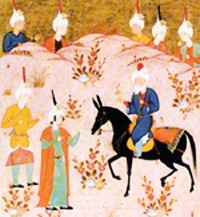Rabi' al-Thani
| Rabi' al-Thani | |
|---|---|
 Ibn Arabi, a Muslim scholar, died in this month | |
| Native name | رَبِيع ٱلثَّانِي (Arabic) |
| Calendar | Islamic calendar |
| Month number | 4 |
| Number of days | 29-30 (depends on actual observation of the moon's crescent) |
| Islamic calendar |
|---|
| Months |
Rabiʽ al-Thani (Arabic: رَبِيع ٱلثَّانِي, romanized: Rabīʿ ath-Thānī, lit. 'The second Rabi', also known as Rabi' al-Akhirah (Arabic: رَبِيع ٱلْآخِرَة, romanized: Rabi' al-ʾĀkhirah, lit. 'The final Rabi'), Rabiʽ al-Akhir (Arabic: رَبِيع ٱلْآخِر, romanized: Rabīʿ al-ʾĀkhir), or Rabi' II is the fourth month of the Islamic calendar. The name Rabī' al-Thani means "the second spring" in Arabic, referring to its position in the pre-Islamic Arabian calendar.
In the days of the Ottoman Empire, the name of this month in Ottoman Turkish was Rèbi' ul-aher, with the Turkish abbreviation Rè,[1] or Reb.-ul-Akh. in western European languages.[2] In modern Turkish, it is Rebiülahir or Rebiülsani.
Meaning
The word "Rabi" means "spring" and Al-thani means "the second" in the Arabic language, so "Rabi' al-Thani" means "the second spring" in Arabic. As the Islamic calendar is a purely lunar calendar, the month naturally rotates over solar years, so Rabīʽ al-Thani can fall in spring or any other season. Therefore, the month cannot be related to the actual season of spring.[3]
Timing
The Islamic calendar is a purely lunar calendar, and months begin when the first crescent of a new moon is sighted. Since the Islamic lunar year is 11 to 12 days shorter than the tropical year, Rabī' al-Thānī migrates throughout the seasons. The estimated start and end dates for Rabī' al-Thānī are as follows (based on the Umm al-Qura calendar of Saudi Arabia[4]):
| AH | First day (CE/AD) | Last day (CE/AD) |
|---|---|---|
| 1444 | 26 October 2022 | 24 November 2022 |
| 1445 | 16 October 2023 | 14 November 2023 |
| 1446 | 4 October 2024 | 2 November 2024 |
| 1447 | 23 September 2025 | 22 October 2025 |
| 1448 | 12 September 2026 | 11 October 2026 |
Islamic events
- 08 or 10 Rabī' al-Thānī, the birth of the Eleventh Imam Hasan al-Askari
- 10 or 12 Rabī' al-Thānī, death of Fatimah bint Musa
- 11 of Rabī' al-Thānī, death of Abdul-Qadir Gilani, the Sufi sheikh who is believed to be the "saint of saints"
- 15 of Rabi' al-Thani, death of Habib Abu Bakr al-Haddad
- 27 of Rabi' al-Thani, death of Ahmad Sirhindi
- 28 or 29 of Rabī' al-Thānī, death of ibn Arabi, the great philosopher from Spain who died and rests in Damascus, Syria.[5]
References
- ^ Youssof, R. (1890). Dictionnaire portatif turc-français de la langue usuelle en caractères latins et turcs. Constantinople. p. 479.
{{cite book}}: CS1 maint: location missing publisher (link) - ^ Young, George (1905). Corps de droit ottoman; recueil des codes, lois, règlements, ordonnances et actes les plus importants du droit intérieur, et d'études sur le droit coutumier de l'Empire ottoman (in French). Vol. 1. Clarendon Press. p. xiv.
- ^ "المنجد في اللغة - المكتبة الوقفية للكتب المصورة PDF". waqfeya.net.
- ^ Umm al-Qura calendar of Saudi Arabia
- ^ "Sheikh Muhyiddin Ibn Al-Arabi (RA) - URS 22 Rabi al-Thani". LoveMeditation-Naqshbandi | Maida Vale Naqshbandi Rabbani Group | Islamic History | Sufi Events | Sufi Saints History. 29 January 2016.
